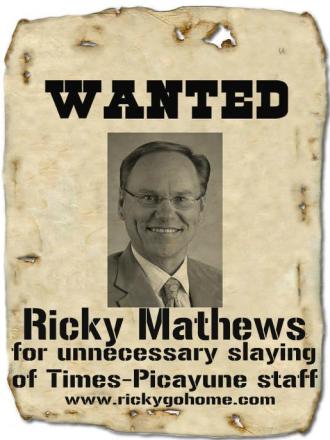Ricky Mathews, the former Mississippi and Alabama newspaper executive promoted within Advance Publications to oversee the 2012 “digital first” transformation of The Times-Picayune that decimated its newsroom and fueled international outcry, is expected to retire Jan. 1, Mobile, Alabama’s alternative weekly Lagniappe has reported.

Fliers papered some New Orleans neighborhoods and businesses in 2012 shortly after Ricky Mathews was hired to oversee the “digital first” transformation of The Times-Picayune.
In a long private post on his Facebook page, Mathews said he made the decision to retire at 59, one year earlier than originally planned because of a health scare last year. He was quoted in a 2011 column in the Mobile Press-Register, of which he was then publisher, that his commitment to physical fitness stemmed from the death of his father from a heart attack at the age of 44.
Mathews’ latest position is president of Advance Southeast Media, the corporate entity that oversees the five Advance newspapers and affiliated websites in Alabama, Louisiana and Mississippi. He was promoted to that position less than a year ago.
“It was a wake-up call …” Mathews wrote about his health scare in the Facebook post, of which several former Advance employees confirmed the authenticity to Lagniappe. “I began planning life changes that would ensure I’d continue to enjoy the blessings of the good health I have now and quality time with friends and family in the next phase of my life. I’m wrapping up the loose ends of that transition now and expect to be retired as of Jan. 1.”
Mathews was named publisher of The Times-Picayune in 2012 following the unexpected retirement of longtime publisher Ashton Phelps, Jr., three months before digital first was implemented. Mathews was subjected to withering public criticism and protests after hundreds of reporters, editors, photographers and production and delivery personnel lost their jobs in 2012, and New Orleans became the largest U.S. city without a daily newspaper.
Mathews’ true role in implementing the changes is not really known. He was not spotted when the emotional and highly publicized mass layoffs unfolded at the newspaper’s headquarters and then-five bureaus on June 12, 2012. After some awkward public appearances, unflattering media interviews, and lengthy front page op-eds in which he attempted to explain and justify the harsh changes, he adopted a much lower public profile before accepting the 2016 regional promotion within Advance from which he will retire.
“It’s not like he came in here and decided to do this. This wasn’t his decision,” a longtime Times-Picayune newsroom employee who lost his job in the cutbacks observed at the time, in an interview for Hell and High Water. “What’s that line from [the movie] ‘Apocalypse Now’? ‘You’re an errand boy, sent by grocery clerks, to collect a bill.’ That’s what Ricky Mathews is.”
Mathews tacitly acknowledged those difficult times in his Facebook post. “Looking back, I’m not sure how I came out of the last 15 years alive,” Lagniappe reported from his post. “It’s no secret that those years were among the most tumultuous in the last century of newspaper publishing in general, and in our region in particular. I took on increasing levels of executive oversight and strategic planning responsibilities at precisely the same time our industry began a battle to re-imagine media in a marketplace flooded with new competitors, new technology and new risks.”
Despite the contempt in which he was held in some New Orleans circles, Mathews’ journalism career was not without awards and high-profile community involvement. He was publisher of Biloxi, Mississippi’s Sun-Herald when it shared the 2006 Pulitzer Prize for Public Service with The Times-Picayune for coverage of the devastation and aftermath of Hurricane Katrina. As Lagniappe noted, Mathews also served on a state board that planned post-Katrina reconstruction in Mississippi. After Advance hired him as publisher of the Press-Register and president of Alabama Media Group in 2009, he served on a similar board there following the 2010 Deepwater Horizon drilling rig explosion in the Gulf of Mexico. He counted governors of both Alabama and Mississippi as friends.
Lagniappe quoted Mathews as commenting in his Facebook post that he’ll now probably join some corporate boards where “my talents as a leader and change agent can be put to use.” He did not respond to an email from Lagniappe for comment before its story was published.
